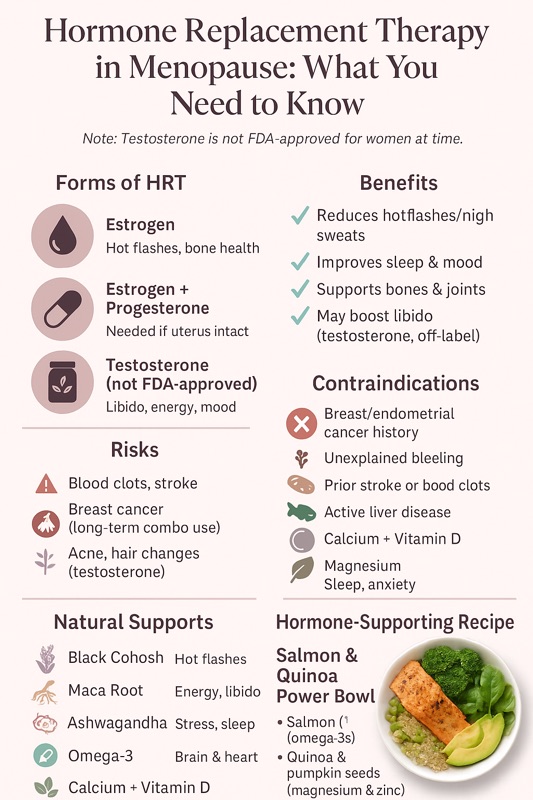🧪Hormone Replacement Therapy in Menopause

Hormone Replacement Therapy in Menopause: Benefits, Risks, and Natural Support
Menopause is a natural transition in a woman’s life, but for many, the symptoms—hot flashes, night sweats, mood swings, weight gain, low libido, and bone loss—can significantly impact quality of life. Hormone replacement therapy (HRT) remains one of the most effective options for managing these symptoms.
This article explores the different types of HRT, including estrogen, progesterone, and testosterone, highlights the benefits and risks, reviews natural supplement options, and offers a hormone-supporting meal recipe.
Types of Hormone Replacement Therapy
1. Estrogen Therapy
- Forms: Oral tablets, patches, gels, sprays, vaginal creams, rings.
- Purpose: Best for hot flashes, night sweats, vaginal dryness, bone health.
- Often prescribed for women who have had a hysterectomy.
2. Estrogen + Progesterone Therapy
- Forms: Pills, patches, intrauterine devices (IUDs).
- Purpose: Required for women who still have a uterus, as progesterone helps prevent uterine cancer that can result from unopposed estrogen therapy.
3. Testosterone Therapy
- Important Disclaimer: Testosterone is not FDA-approved for women in the U.S. at this time, but some providers prescribe it off-label.
- Forms: Creams, gels, pellets, compounded formulations.
- Purpose: Can improve low libido, energy, and mood.
- Caution: Dosing must be carefully monitored to avoid side effects like acne, hair growth, or voice deepening.
Benefits of HRT
- Reduces hot flashes, night sweats, and vaginal dryness
- Improves sleep, mood, and concentration
- Supports bone health, lowering osteoporosis risk
- May help maintain skin elasticity and joint comfort
- Testosterone (off-label use) may improve sexual satisfaction and energy
Risks of HRT
- Estrogen/Progesterone: Slightly increased risk of blood clots, stroke, breast cancer (when combined therapy is used long term)
- Testosterone: Acne, hair growth, deepened voice, changes in cholesterol, liver function issues if overdosed or used long-term
- Other Considerations: Individual risk depends on age, health history, timing of initiation, and dose
Contraindications (Who Should Avoid HRT)
- History of breast or endometrial cancer
- Unexplained vaginal bleeding
- History of blood clots or stroke
- Active liver disease
- Untreated high blood pressure
Always consult with a qualified healthcare provider before starting therapy.
Natural Supplement Options
While supplements are not a replacement for HRT, some women find relief with:
- Black Cohosh – May help with hot flashes
- Maca Root – Supports energy and libido
- Ashwagandha – Helps reduce stress and improve sleep
- Omega-3 Fatty Acids – Reduce inflammation, support heart and brain health
- Calcium + Vitamin D – Protect bone strength
- Magnesium – Improves sleep, reduces anxiety, supports muscle and bone health
Hormone-Supporting Meal Recipe
Salmon & Quinoa Power Bowl
A meal rich in omega-3s, fiber, and phytonutrients to support hormone balance.
Ingredients (Serves 2):
- 2 wild-caught salmon fillets (4–6 oz each)
- 1 cup cooked quinoa
- 1 cup steamed broccoli
- 1 cup baby spinach
- ½ avocado, sliced
- 2 Tbsp pumpkin seeds
- Dressing: 2 Tbsp olive oil, juice of 1 lemon, 1 tsp Dijon mustard, pinch of sea salt
Instructions:
- Season salmon with salt, pepper, and a drizzle of olive oil. Bake at 400°F for 12–15 minutes or until cooked through.
- Prepare quinoa according to package instructions.
- Steam broccoli until bright green and tender.
- In a bowl, layer quinoa, spinach, broccoli, salmon, and avocado.
- Sprinkle with pumpkin seeds and drizzle with dressing.
Benefits:
- Salmon provides omega-3s for brain and hormone health.
- Quinoa and pumpkin seeds supply magnesium and zinc.
- Avocado and olive oil give healthy fats for hormone production.
- Broccoli provides compounds that support estrogen metabolism.
Final Thoughts
Hormone replacement therapy can be life-changing for many women navigating menopause, but it’s not a one-size-fits-all solution. Testosterone therapy—while showing promise—is not FDA-approved for women at this time, and should only be used with careful medical supervision.
For those seeking alternatives or added support, lifestyle habits, balanced nutrition, and targeted supplements can play an important role.
Always discuss options with your healthcare provider to create a safe, personalized plan.
Disclaimer:
This blog post was formatted with the assistance of AI technology; however, all content and ideas presented are original and authored by me.
Comments
Post a Comment